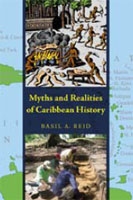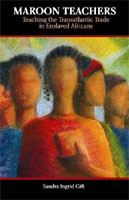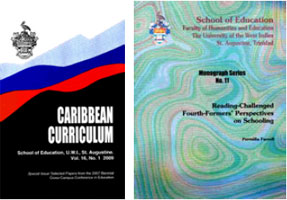|
July 2009

Issue Home >>
|
Bookshelf

Preserving Patois
A new songbook and CD, called Vini Chanté an Patwa (Come Sing in Patois) was launched at the Centre for Language Learning (CLL) Auditorium, UWI, last month. They were created to ensure the posterity of the French Creole (Patois) language in Trinidad.
This songbook showcases 29 traditional Patois (Kwéyòl) songs, along with a monologue. Everything is translated into English, alongside explanations detailing the modern spelling system used for Patois. The project was organised by Florence Blizzard and Nnamdi Hodge, and was made possible by the grant of a bpTT Spirit of Community Award in Arts and Culture to the organisation Women Working for Social Progress (Workingwomen). The songbook also provides readers with a brief history of the language in Trinidad. The CD, which accompanies the book, features the voices of members of the Vini Chanté choir, born out of a Workingwomen Patois class taught by Hodge. He is a graduate of UWI, where he read French-lexicon Creole (Patois) in the Department of Liberal Arts. The songbook is published by the UWI-based Society for Caribbean Linguistics.
|

New guide for asthma care
“Caribbean Asthma Guidelines,” a book targeting medical practitioners, especially in terms of recent changes in asthma care in the Caribbean, was launched at the end of June. The lecture and launch were hosted by The Faculty of Medical Sciences, UWI in collaboration with The Caribbean Health Research Council, and Professors Lexley Pinto Perreira (Department of Para-Clinical Sciences) andTerence Seemungal FRCP PhD (Department of Clinical Medical Sciences) were there to speak on the updated material. |

Unlocking narratives
By Kevin Farmer
The relevance of Myths and Realities of Caribbean History in relation to Caribbean history syllabi, as well as CXC and CAPE examinations wa s emphasised during the book’s launch, as well as by its author, Dr Basil Reid during a public lecture at the Barbados Museum and Historical Society (BMHS) in April. Given that the book is based on the most current archaeological research, the author recommended it be included as a required history text for secondary students throughout the Anglophone Caribbean.
Both the launch and public lecture were attended by members of the public interested in the history of the Caribbean from 7,000 years ago to the period of Spanish contact in the late 15th century and early 16th century. Dr Reid, a Lecturer in Archaeology at UWI, St. Augustine stressed that contrary to popular perceptions, the Caribbean did not begin with the arrival of Columbus in the region in 1492, but with the arrival of natives from South America who settled Banwari Trace in southwest Trinidad in 5000 B.C.
The lecture debunked several assumptions about the region’s history relating to the use of the terms Arawak and Carib, Ciboneys and Island-Carib cannibalism etc. Dr Reid also placed scholarly spotlight on emerging definitions of history, the multiplicity of cultural groups that inhabited the Caribbean for thousands of years as well as the origins and spheres of influence of these groups. Dr Reid’s presentation showed the continuing relevance of archaeology in unlocking many narratives of the Caribbean past.
The BMHS’s lecture room was full to capacity during the lecture which was followed by a very lively 30-minute question and answer session. Among those attending were Ronald Jones, Minister of Education and Youth Affairs in Barbados, Alissandra Cummins, Director of the Barbados Museum and Historical Society, and Maureen Grazette, Assistant Registrar of the Caribbean Examination Council., all of whom received complimentary copies of the book.
Kevin Farmer is Curator of History and Archaeology at the Barbados Museum & Historical Society.
|

A starting point
Sandra Gift, of the Quality Assurance Unit of the Office of the Board for Undergraduate Studies, UWI, has transformed her doctoral dissertation (she has a PhD in Education) into the book, Maroon teachers: Teaching the Transatlantic Trade in Enslaved Africans.
The book was featured in Choice a publication of the Association of College and Research Libraries (US) in a review by H.M. Miller of Mercy College.
Miller found that, “Teaching about slavery remains a challenge for many educators, suffused as the topic is with elements of blame, shame, guilt, anger, and ongoing issues of racial strife,” and that in the US the focus is primarily on the South and its plantation system with slavery depicted as an evil of the past.
“A strength of this book is that it adds to the literature by looking at slavery from an international perspective—as viewed by educators in Africa, the Americas, the Caribbean, and in Europe,” he wrote.
The book builds on descriptions and excerpts from interviews with educators, and Miller recommends it for graduate and research collections, though he felt it lacked a “roadmap for slavery education that could be adopted by classroom teachers.” Overall, he found the book full of insights into slavery studies and suggests that it could be the starting point for curriculum development in this area.
The book is available from Keith Khan’s Books Etc. 58 Frederick St Port of Spain and 14 Navet Road, San Fernando. It is also available from Ian Randle Publishers Kingston, Jamaica
|

Learning and teaching
The School of Education (SOE ) has published Volumes 16 (1), and 16(2), 2009 of its journal Caribbean Curriculum. Volume 16(1) is a special issue containing selected, refereed papers from the 2007 Biennial Cross-Campus Conference in Education. Vol. 16(2) contains the following articles: “Secondary Science Teachers’ Metaphors: A Case Study, Parts 1 & 2,” by Susan Herbert; “Lower Secondary Science Students’ Misconceptions of Ozone Depletion and Global Warming,” by Rawatee Maharaj-Sharma; “A Qualitative Evaluation of the Lower Secondary SEMP Science Curriculum of Trinidad and Tobago” by Dorian Barrow and Jerome De Lisle; and “Factors Impacting on Student Learning: A Preliminary Look at the National Test of Trinidad and Tobago,” by John O. Anderson, June George, and Susan Herbert.
The School has also published the following monograph in its Monograph Series: “Reading-Challenged Fourth Formers’ Perspectives on Schooling” by Permilla Farrell (Monograph No. 11).
Copies of all three publications are available from the School of Education: Issues of Caribbean Curriculum from the SOE Library a cost of TT $20. Enquiries to (868) 662- 2002, Ext. 3718.
Copies of the Monograph from the Caribbean Educational Research Information Service (CERIS) at a cost of $35. Enquiries to Leah Gordon, (868) 662-2002, Ext. 4048. |
|





